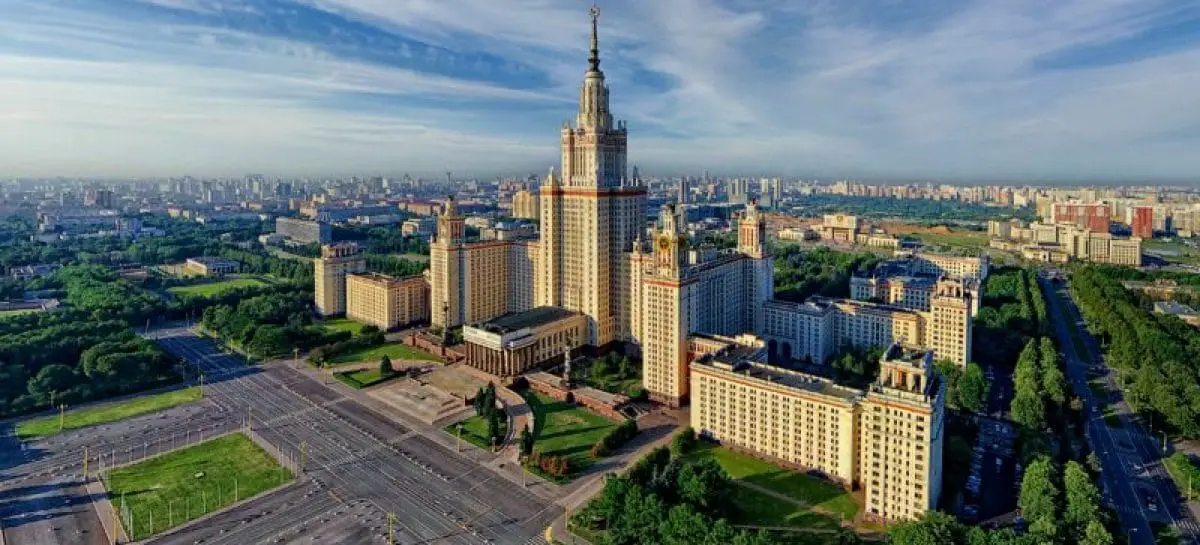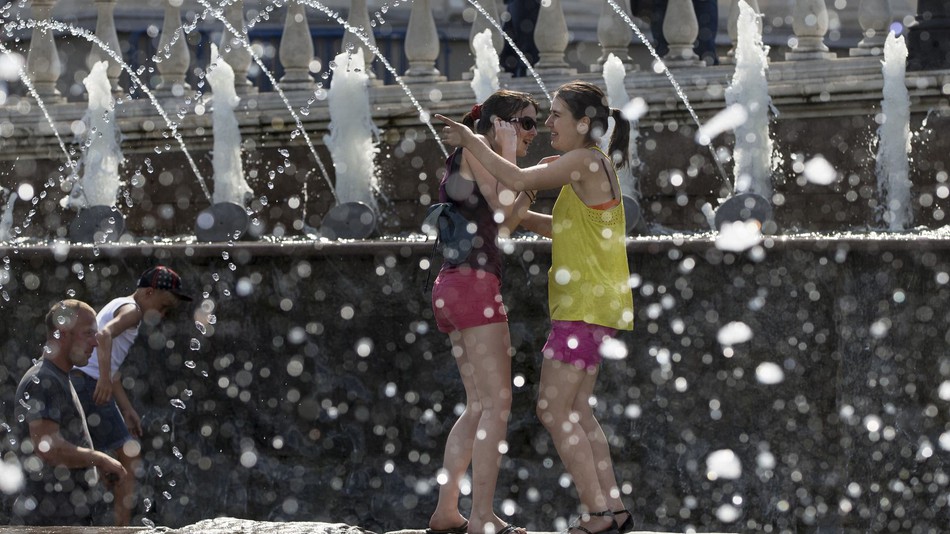After an eventful year starting her new major and facing down a serious hospitalization, Olga faces perhaps the still most stressful part of any semester: passing finals week. For most degree courses in Russia, it is not possible to pass the class without passing the final. Because degree programs are so rigidly structured, trying to make up a class that one has failed is also strikingly difficult.
In the following text, Olga details her experience of preparing for, dealing with the stress of, and taking her finals at Moscow State University. This is part of a series of free Russian lessons sponsored by SRAS called Olga’s Blog. The blog documents – in simplified, modern Russian – Olga’s experience finishing high school, starting college, and living life in Moscow in 2006. The text, links, and format of this resource were last updated in 2023.
Briefly on Finals in Russia
In Russia, finals week is referred to as “sessiya” (сессия) and sometimes as “closing the semester” (закрытие семестра). Similar terminology is used in accounting for closing the month or year – all figures are checked and double checked before being transferred to fresh time-frame. In Russia, finals are view in much the same way – assuring with definite accuracy that the student has added the entire curriculum for the semester to their knowledge before they pass on to the next highly structured semester.
“Sessiya” is thus a high-stakes, high-stress time for students. However, as Olga describes it below, it is obviously not an altogether unpleasant time for all. Olga seems to enjoy the late nights and hard work she puts into making sure she passes the exams.
“Entering” finals week is also a formal process in Russia. First, one pass “zachyoty” (зачеты). This word also translates as “test” or “exam.” It also has cross-over applications in accounting. However, “zachyoty” are only pass-fail and meant to indicate that the student has attended the course and completed the work and is now eligible (and formally invited) to enter finals week.
Lastly, as Olga points out, the fact that ends of the semesters come at differing times of Russia’s extreme weather – heat in the summer and cold in the winter – can only add to any stress that the students might be feeling at the time.
Taking Finals in Russia: Simplified Russian Text from Olga’s Blog
This is Lesson 9 of Olga’s Blog, a series of intermediate Russian lessons.
Note that:
- All of the bold words and phrases have annotation below.
- Red words and phrases indicate the subject of this blog entry’s grammar lesson.
- *Asterisks indicate slang.
Дорогие друзья,
Майская жара накрыла Москву. Столбики термометров поднимались до температуры 35 градусов °C! Палящее солнце обжигало плечи, духота и зной мешали привычному образу жизни. Охлажденные напитки расходились в считанные часы, на центральных площадях били фонтаны.
Однако накаленная обстановка была не только на улице, но и в университетах. Ведь, как вы знаете, начало лета – это сессия!
Нам, первокурсникам факультета мировой политики МГУ, уже не было так страшно, как зимой, однако все нервничали. Зимой то у нас было всего три экзамена, а сейчас – целых пять! После того, как все семь зачетов были сданы, и в зачетке* появился штамп – «ДОПУЩЕН К ЭКЗАМЕНАЦИОННОЙ СЕССИИ», наши мысли полностью переключились на экзамены. Подготовка кипела. Кто-то делал билеты сам по книгам, кто-то делил работу пополам с приятелем, уже сдавшие группы отдавали свои конспекты и лекции оставшимся. Мозги работали в ускоренном режиме, даже по ночам организм накапливал не энергию, а знания.
Печатались и резались шпоры.* Кстати, о шпорах – это неотъемлемая часть подготовки к экзаменам. Студенты делают их не только для того, чтобы все скатать, а в большей степени для уверенности. И вот к первому экзамену – философии мы все были экипированы.
Философию наша группа сдавала самой первой, потому, что наш преподаватель собирался в отпуск. В головах были сосредоточены полученные за год и выученные ночами знания, а карманы топорщились от свернутых шпор. Зайдя в кабинет, мы оставили свои зачетки, вытянули билеты и сели готовиться.

Несмотря на отсутствие страха и хорошую подготовку, из нашей группы шесть человек были отправлены на пересдачу. Пересдавать предмет можно три раза. В случае полного провала в университет вызываются родители, и собирается комиссия. Поднимается вопрос об отчислении. Но такого в дальнейшем ни с кем из моих однокурсников не случилось.
Философию я сдала на четыре и приступила к подготовке к английскому. Здесь все было намного проще. Можно сказать, к нему я подготовилась за один вечер, и благополучно получила пятерку. Одну девушку из нашей группы отправили на пересдачу – увидели на ее коленках шпаргалку. Оставалось еще три экзамена – экономика, информатика и история России.
Но больше об этом в следующий раз!
Vocabulary and Cultural Annotations
Палящее солнце обжигало плечи: The scorching sun burned (our) shoulders.
Духота и зной: Stuffy and sultry. Both words are most often used to describe the qualities of air. At the peak of summer, Moscow can experience heat of more than 100 degrees Fahrenheit, with 100% humidity, carried down by winds from the Bay of Finland.
Охлажденный: Cooling. In reference to drinks, it also carries the meaning of ‘refreshing” and “quenching.”
Фонтаны: Fountains. Fountains are fairly common in major cities in Russia and their operation is a major symbol of summer for most Russians. Moscow students also have a tradition of jumping into the fountains after their exams are completed.
Сессия: Finals.
Зачетка: Student’s record book. Each student must carry and keep a small book of their academic history. The book is presented at the beginning of each exam, updated by the teacher after the exam, and returned to the student.
Кто-то делал билеты сам по книгам: Some people make questions themselves from the books. “Билеты” are small pieces of paper with individual questions for each student. Usually each student has one question to answer, orally and in private consultation with the professor. Based on the results of the answer, the student receives his/her grade, which often accounts for the vast majority of the final grade received for the class.
Кто-то делил работу пополам с приятелем: Some people divide the work in half with a friend. Essentially, they pair up as study partners, usually developing questions from the book and quizzing each other. Note that in Russian “кто-то,” while singular, is often used in the same context that “some” or “some people” is used in English.
Cдавшие группы отдавали свои конспекты и лекции оставшимся: Groups that had already taken the test gave their notes and lectures to groups who had not taken the exams. “Lectures” are usually written verbatim from what the professor said in class.
Ускоренный: Accelerated.
Даже по ночам организм накапливал не энергию, а знания: Even at night, our bodies did not accumulate energy, but knowledge. Here, Olga means that rather than sleeping, students would spend their nights studying.
Печатались и резались шпоры: Crib sheets were written and cut out. Usually each “шпаргалка” (also known as “шпора” in slang) has one short answer and is cut from a larger piece of paper so that each can be kept separately in the pocket. The cutting process is needed because index cards are generally not used in Russia.
…в большей степени для уверенности: …in large part for confidence. It seems to be a widely accepted belief among students that simply having the crib sheets in one pocket gives one a sense of confidence and thus helps one to pass the test. It seems that simply having the crib sheets would not be considered an infraction, as it might be in the US – so long as the crib sheets stay in the pocket.
Наш преподаватель собирался в отпуск: Our professor intended to go on holiday. Most universities do not have a summer session and often university staff depart to dachas, relatives, and increasing are even traveling abroad during their time off. They may arrange with other teachers to time their testing period first if they wish to leave town earlier. Students occasionally do this as well, arranging to take tests early so that they can begin their travels earlier.
Карманы топорщились от свернутых шпор: Pockets bristled with rolled-up cribs.
Шесть человек были отправлены на пересдачу: Six people were sent to retake the test. If a student fails a test, he/she can retake the test at a later date. Also, if the student is unhappy with his/her grade, he/she can request a “пересдача,” or “retake.” Up to three “пересдачи” can be taken for each course.
Вызываются родители, и собирается комиссия: They call (your) parents, and a committee gathers. This committee of faculty members from the department will give you essentially your fourth and final try to prove yourself on the subject.
Поднимается вопрос об отчислении: The question of expulsion is raised. If the student is unable to pass a final exam, he/she may be expelled from the program. It is also worth mentioning that some students in some institutions attempt to bypass this possibility altogether by a process known as “подкуп” which means “purchase,” though usually through less than moral means. While some students report that buying grades is still rampant at their universities (one student we spoke to stated that an “A” can be bought for around 5000RUR or about 200USD, though pricing varies based on the difficulty of the course of the grade you want – a “C” can be bought for less), others, such as Olga, report that practice seems to have disappeared at their institutions.
Увидели на ее коленках шпаргалку: They saw her crib sheet on her lap. Of course, actually using the cribs during the exam is considered cheating. However, punishment for the offense usually only amounts to retaking the exam.
Grammar Focus: Reflexive Verbs (Part 1)
Reflexive verbs are traditionally used in languages to form sentences wherein the subject and  direct object are the same. These verbs are formed in Russian by adding a suffix to the verb. The suffix used is a reduction of the reflexive pronoun “себя” (oneself): “-ся” is added after verb forms ending in consonants; “-сь” is added after vowels.
direct object are the same. These verbs are formed in Russian by adding a suffix to the verb. The suffix used is a reduction of the reflexive pronoun “себя” (oneself): “-ся” is added after verb forms ending in consonants; “-сь” is added after vowels.
English most often forms reflexive sentences by using a reflexive pronoun to indicate the direct object. For example: “The child threw itself to the ground.” However, some verbs are automatically understood to be reflexive in the event that no other direct object is stated. For example, in the sentence “he shaves everyday,” it is understood that he shaves himself everyday.
Russian always indicates reflexive verbs with the suffixes described above. Also, if compared to English, Russian uses the reflexive much more often and for a wider variety of purposes. Reflexive verbs in Russian can be used in six different grammatical functions. Three are covered below. Three more will be covered in our next blog edition.
Passive reflexive verbs
Russian reflexive verbs can be used to indicate passive voice. It very often removes the actor from the sentence and almost implies that direct object acted on itself to achieve the end result – rather than in the usual case of implying that the actor acted upon his/her/itself (but it is generally understood that the actor is simply not identified). The following two examples of this type of use of reflexive verbs occur in this month’s Olga’s Blog.
Печатались и резались шпоры. – Crib-sheets were printed and cut out.
Поднимается вопрос об отчислении. – The question of expulsion is raised.
The actor, if mentioned, is expressed in the instrumental case. For example, one could say “Печатались и резались шпоры cтудентами,” or, “Crib sheets were printed and cut out by the students.” “Students” is not the subject of the sentence in either the Russian or English variants here, but it is made clear within the grammar that the students were the actors in the process described. In cases such as these, the object usually starts the sentence and is followed by the actor. In these cases, the object of the sentence usually starts the sentence and the actor only mentioned later.
Examples from Literature and the Press
Офицер бросает карандаш, поднимается. А. Panteleev
В журналах печатались стихи и песни. Lib.ru biography of A. Rozenbaum
Lexical reflexive verbs
Some verbs in Russian must be used in the reflexive. There really is no logical explanation for why this is (although, there are entomological explanations and theories for individual cases). These types of grammatical oddities occur in every language and must be simply learned individually and accepted. Before you get let yourself say “wow, Russian is really weird,” remember that English is also peppered with these types of oddities. For example, we say “He sailed across the Atlantic Ocean” but we also say “He went fishing at Parson’s Pond.” Both the Atlantic Ocean and Parson’s Pond are specific bodies of water. However, one requires that an article be placed before it. The other does not. Что делать?
This month’s Olga’s Blog gives an example of a lexical reflexive verb:
Такого в дальнейшем ни с кем из моих однокурсников не случилось. –
This did not happen to even one my classmates in the following time period.
Other examples include several verbs that indicate or help indicate emotion (бояться, гордиться, смеяться – to fear, to be proud, to laugh), a few that indicate existential states (казаться, случаться – to seem, to happen), and some relating to sleep (сниться, просыпаться – to dream, to wake up). But there is no rule!
Examples from Literature and the Press
И снится им прекрасная, В улыбках солнца ясная Красавица весна. S. Esenin
Когда я сегодня проснулась, встала и умылась, то мне вдруг стало казаться, что для меня все ясно на этом свете. A. Chekhov.
Optative reflexive verbs
The optative mood suggests a desire or inclination to do something. Again, English does not use reflexive verbs in exactly this way, so the construction might seem strange at first. English often phrases the same thought with collocations such as “I would like to” or “I don’t feel like.”
While this month’s blog does not give an example of optative reflexive verb, they are often used in Russian.
Мне спится – I would like to sleep
Мне не хочется есть – I don’t feel like eating
Note that some verbs are sometimes preceded by the reflexive form of “хочеть,” rather than being made reflexive themselves (in a construction that, in some ways, is more similar to its English equivalent). Students who have had little experience practicing with native speakers may want to rely on using the “хочется” form, as it is more often used in Russian. However, students should be aware that both forms may occur. For example, in the following poem by M. Manuilova, which mixes various reflexive forms and is meant to be humorous:
Мне не естся
И не спится,
Не сидится,
Не лежится,
Не смеётся,
Не поется-
Лишь душа
Работать рвется!
Как же на неё сердиться?
Слава ждет!
Пошла трудиться!
Other Examples of Optative Reflexive Verbs
Он одинок. Живется ему скучно, его ничто не интересует. A Chekhov
А мне не хочется быть самым богатым на кладбище. A. Tabokov
More Free Russian Lessons From Olga’s Blog

The Language and History of Caviar: Olga’s Blog
Olga below describes the place of caviar in Russian food culture. In simplified Russian, she describes where the delicacy is harvested from, the major types of caviar, and how the types differ in cost and quality. We also provide an English primer below discussing more of the history of caviar, how it is eaten and […]

Mushrooms in Cultures and Cuisines: Olga’s Blog
Olga below continues her discussion of the deeply held place that mushrooms have in Russian culture. In part one of this discussion, she focused on how and where and find the mushrooms. In part two, below, she discusses how the mushrooms are preserved, prepared, and consumed. A staple of the regional diet for centuries, mushrooms […]

Mushroom Season Has Begun! Olga’s Blog
Olga below discusses the deeply held national tradition of mushroom gathering. An important part of Russian food tradition for many centuries, Russian children are taught in school from an early age to tell the difference between various types of native mushrooms. Many, like Olga, will go with relatives and friends to the woods to put […]

Study Abroad in America for Russians: Olga’s Blog
As part of her major program in international relations at Moscow State University, Olga applied to study abroad in the United States in 2007. As was not uncommon for students applying for study abroad in either direction, Olga hit several bureaucratic snags. What is perhaps most remarkable about the below text, however, is the description […]

What is the First Day of University Like in Russia? Olga’s Blog
Below, Olga discusses what a first year freshman experiences on day one of their college education. The day offers no classes. It is instead filled with speeches, handshakes, and status symbols. All of this is highly indicative of the role of formality and ceremony in Russian education and Russian society. This resource is part of […]





